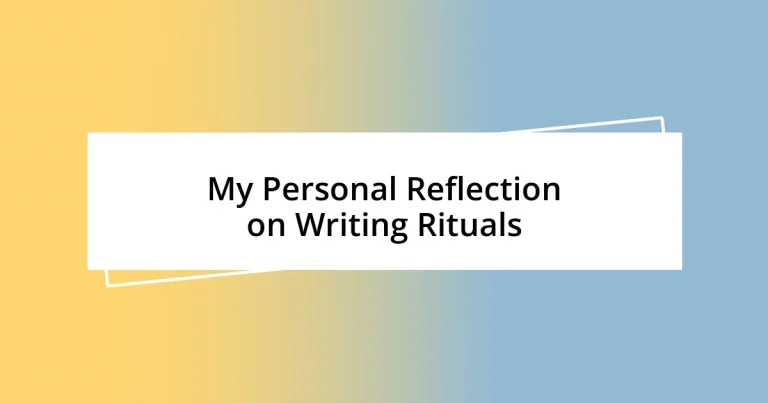Key takeaways:
- Creating personal writing rituals, such as a cozy environment and routine practices, enhances focus and creativity.
- Establishing a consistent writing schedule fosters a natural flow of inspiration and accountability through collaboration.
- Incorporating mindfulness techniques, like gratitude and nature immersion, elevates the writing experience and promotes deeper connections to creativity.

Understanding Writing Rituals
Writing rituals serve as anchors in the chaos of life. I remember the moment I discovered my own ritual: a warm cup of chai and soft instrumental music playing in the background. It transformed my writing process into a delightful escape, inviting creativity to flow more freely.
At times, I wonder how much our environment shapes our writing. For instance, I’ve noticed that writing in the morning, before the world wakes up, brings a certain clarity to my thoughts. These small acts, whether it’s lighting a candle or doodling in a notebook, can significantly impact our mindset, making the writing experience feel sacred.
Every writer’s ritual is unique and deeply personal. Have you ever felt the thrill of a particular routine sparking your imagination? From the type of chair I sit in to the specific pen I use, these details, while seemingly trivial, often become the keys that unlock fresh ideas and profound insights. It’s fascinating how such rituals create a sense of belonging within the writing space, don’t you think?
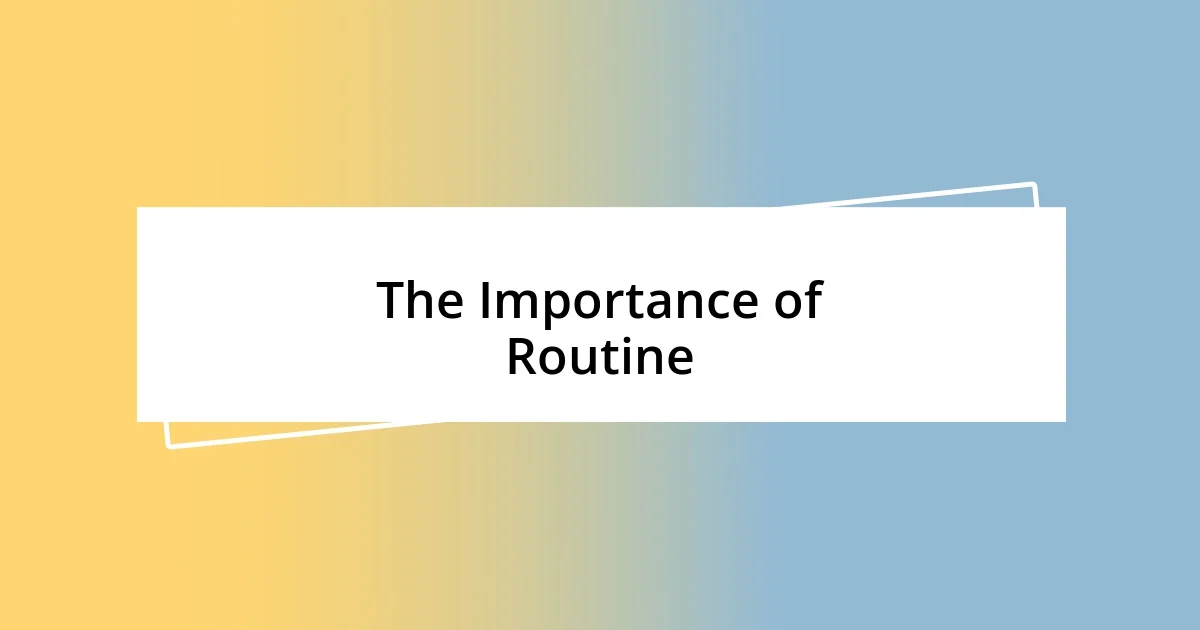
The Importance of Routine
Establishing a routine has been a game-changer for me when it comes to writing. There’s something about the predictability of a set schedule that allows my mind to settle into a creative space. For example, I’ve found that when I sit down at the same time each day, my thoughts begin to flow more seamlessly. It’s almost as if my brain starts to recognize that it’s time to create.
- Routine reduces decision fatigue, allowing me to focus solely on writing.
- It helps shape a disciplined approach, cultivating consistency over time.
- Having a routine often leads to unexpected bursts of creativity, revealing ideas during those familiar moments.
- I feel a sense of accomplishment that boosts my confidence with each completed session.
- Regularity nurtures a safe environment, letting me dive deeper into my thoughts without distractions.
In my experience, these small yet powerful habits set the stage for inspiration, transforming writing from a task into a fulfilling ritual.
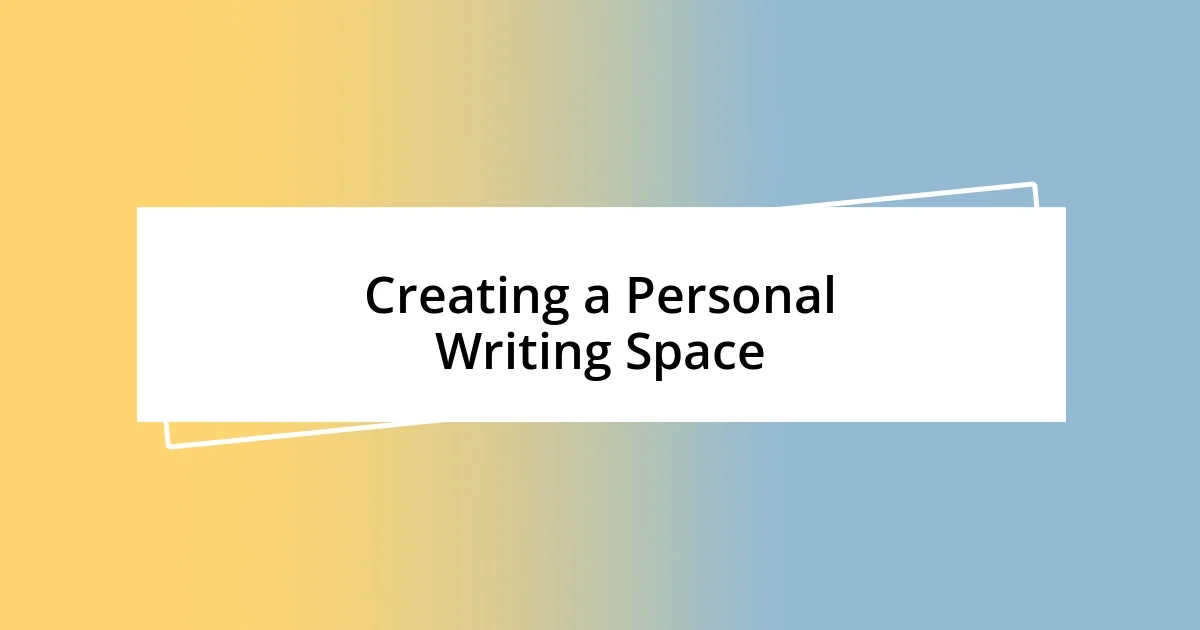
Creating a Personal Writing Space
Creating a personal writing space is crucial for nurturing creativity. I’ve learned that having a designated area can change my mindset entirely. For me, my writing desk is more than just a piece of furniture; it’s a sanctuary filled with my favorite books, photos, and little treasures that spark joy. The act of sitting down at that desk signals my mind that it’s time to create.
When I first began writing, my space was cluttered and uninspiring. However, I soon realized that simplicity breeds focus. A minimalist approach, like removing unnecessary distractions, made a significant difference in my productivity. I remember my first attempt at decluttering; I was amazed at how my thoughts became clearer, almost as if I was giving my brain the space to breathe.
Lighting plays a vital role in my writing environment as well. I’ve found that warm, soft lighting helps set a cozy atmosphere that encourages reflection and deep thought. Occasionally, I’ll change the intensity of the lights depending on my mood. For example, dim lighting invites a sense of calm when drafting poetry, while brighter lights ignite energy for brainstorming. Creating that ideal writing atmosphere truly transforms my experience.
| Aspect | Personal Experience |
|---|---|
| Environment | Your writing space should inspire you—like my desk filled with meaningful items. |
| Clutter | Starting with a clean, organized environment opened my mind to new ideas. |
| Lighting | Adjusting the light helped me connect differently with my writing mood. |

Tools for Effective Writing Rituals
When it comes to effective writing rituals, tools play a pivotal role in enhancing focus and creativity. For instance, I like to use a digital writing tool, like Scrivener, during my sessions. The way it organizes my thoughts and ideas feels almost like having a personal assistant, and it streamlines my flow immensely. Have you ever tried writing with a tool that just clicks for you? It’s a game changer.
Another indispensable tool in my writing arsenal is a good old-fashioned notebook. There’s something about putting pen to paper that sparks my imagination. I still remember the day I ventured out to a café with my favorite notebook, seeking inspiration amidst the chatter and aroma of coffee. Scribbling my ideas down while soaking in the atmosphere made all the difference—sometimes, the simplest tools unlock our best creativity.
Lastly, I cannot emphasize enough the value of timers. I often use the Pomodoro technique, where I set the timer for 25 minutes to focus intensely on my writing. It’s fascinating how an external pressure can propel my thoughts faster, almost like a friendly nudge. Have you felt that rush that comes when the deadline approaches? Those short bursts help me stay on track and feel accomplished—particularly when I see how much I can achieve in just a few focused minutes.
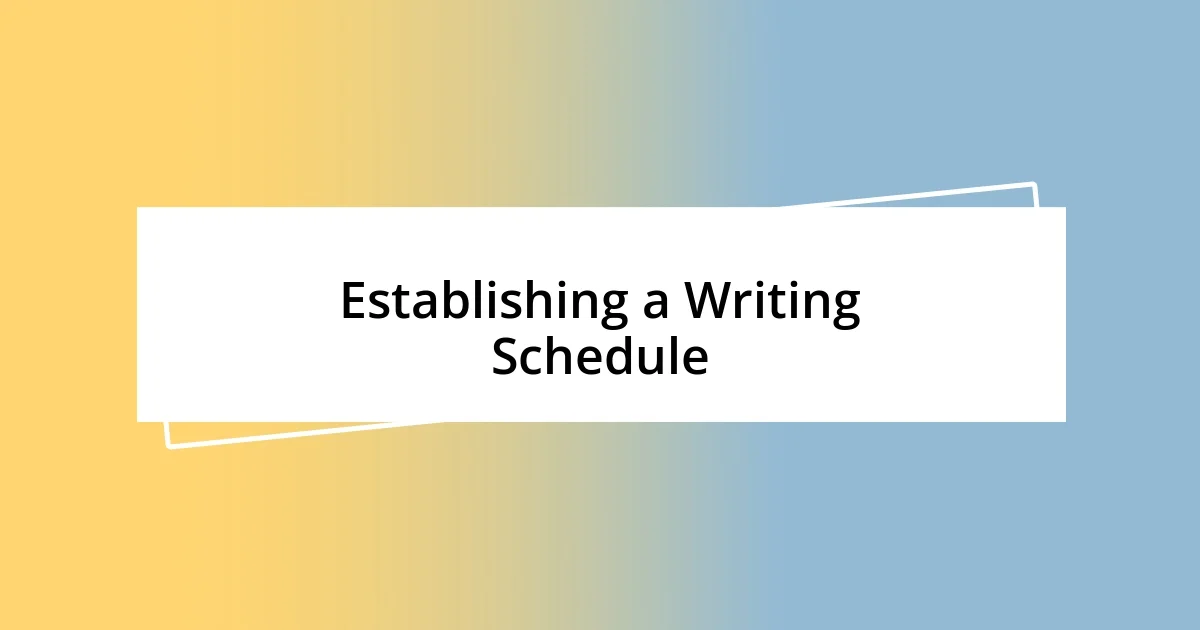
Establishing a Writing Schedule
Establishing a writing schedule has been a transformative journey for me. Initially, I struggled to find the right time to write, often waiting for inspiration to strike. However, I soon discovered that by setting specific writing blocks in my day, I could cultivate that inspiration instead. Have you ever noticed how dedicated time can create that all-important flow?
I remember the day I committed to a consistent writing time every morning before the world woke up. Just those quiet moments, sipping my coffee and jotting down thoughts, became sacred. It felt like I had carved out a little retreat for creativity amidst life’s chaos. That routine not only sharpened my focus but also made writing a natural part of my daily rhythm.
There’s also something powerful about the accountability a schedule brings. When I decided to share my writing goals with a fellow writer, I felt an undeniable surge of motivation. Our weekly check-ins became a source of encouragement, pushing me to stay on track. Have you tried collaborating with someone on your writing journey? It’s fascinating how mutual support can amplify our creativity and drive.
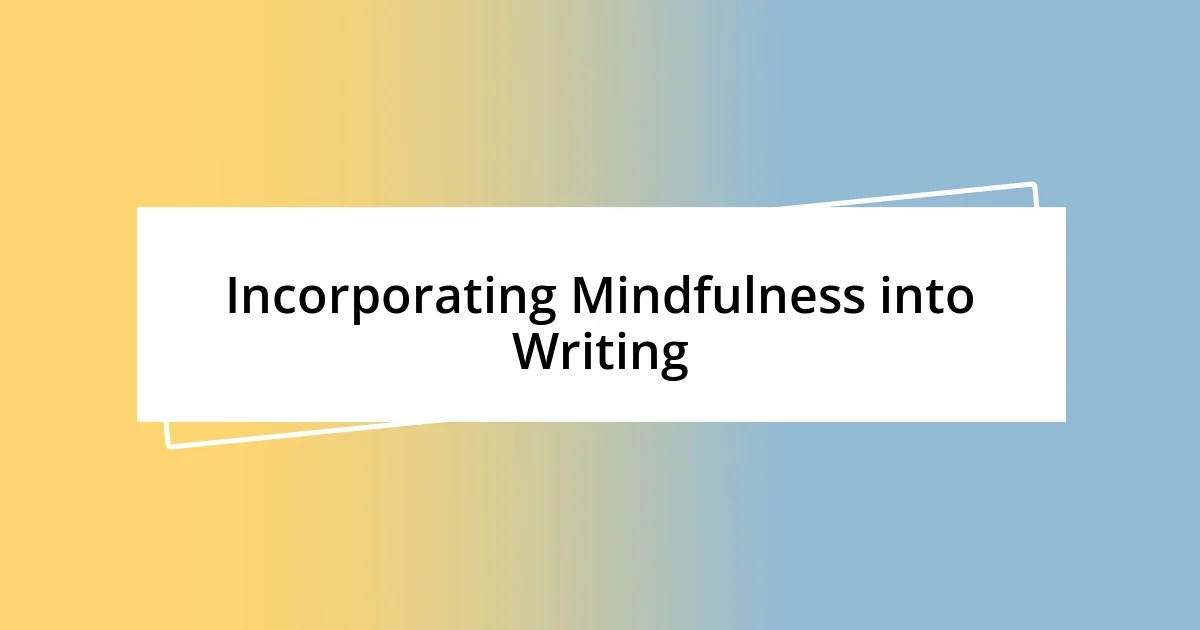
Incorporating Mindfulness into Writing
Incorporating mindfulness into writing can truly elevate the experience. I remember sitting cross-legged on my living room floor, feeling the texture of the carpet beneath me as I took a few deep breaths before starting to write. This grounding practice helped me become acutely aware of my thoughts and feelings, allowing my words to flow more naturally. Have you ever noticed how simply pausing to breathe can shift your mindset?
One strategy I’ve found effective is the practice of gratitude before writing. Each morning, I jot down three things I’m thankful for, creating a positive mental space. It’s intriguing how this simple act can transform my approach, making my writing feel less like a chore and more like an expression of joy. Have you considered how gratitude might influence your creative flow?
Lastly, immersing myself in nature has been a game-changer for my writing mindfulness. During walks in the park, I soak in the sights and sounds around me—the rustling leaves, chirping birds, and gentle breeze. This connection to the environment refuels my creativity. Have you ever tried writing inspired by nature’s tranquility? It often leads to a deeper sense of clarity and connection in my work.

Evaluating and Adapting Your Rituals
Evaluating your writing rituals involves a keen sense of self-awareness. I recall a time when I rigidly stuck to my morning schedule, convinced that it was the only way to write effectively. Then, I realized I was merely going through the motions, devoid of any real passion. This led me to question: am I truly honoring my creative process, or just adhering to a preconceived notion of productivity?
Adaptation is key. I have shifted my writing times based on how I feel; sometimes, an afternoon burst of creativity calls me to the keyboard. It’s amazing how listening to my body and mind can lead to more authentic writing. Have you ever felt the need to change your environment or timing to rekindle your inspiration? I’ve found that switching up my setting—like writing in a cozy café instead of my desk—can ignite new ideas and a fresh perspective.
It’s essential to periodically revisit and evaluate your rituals to ensure they serve you well. I remember a phase when my rituals revolved around complex preparations, which seemed to drain my energy rather than enhance it. Now, I keep my processes simple and adaptable. What about you? Are your rituals working for you, or have they become a burden? Being flexible has opened up my writing to new, unexpected avenues that I never would have explored had I clung too tightly to old habits.












